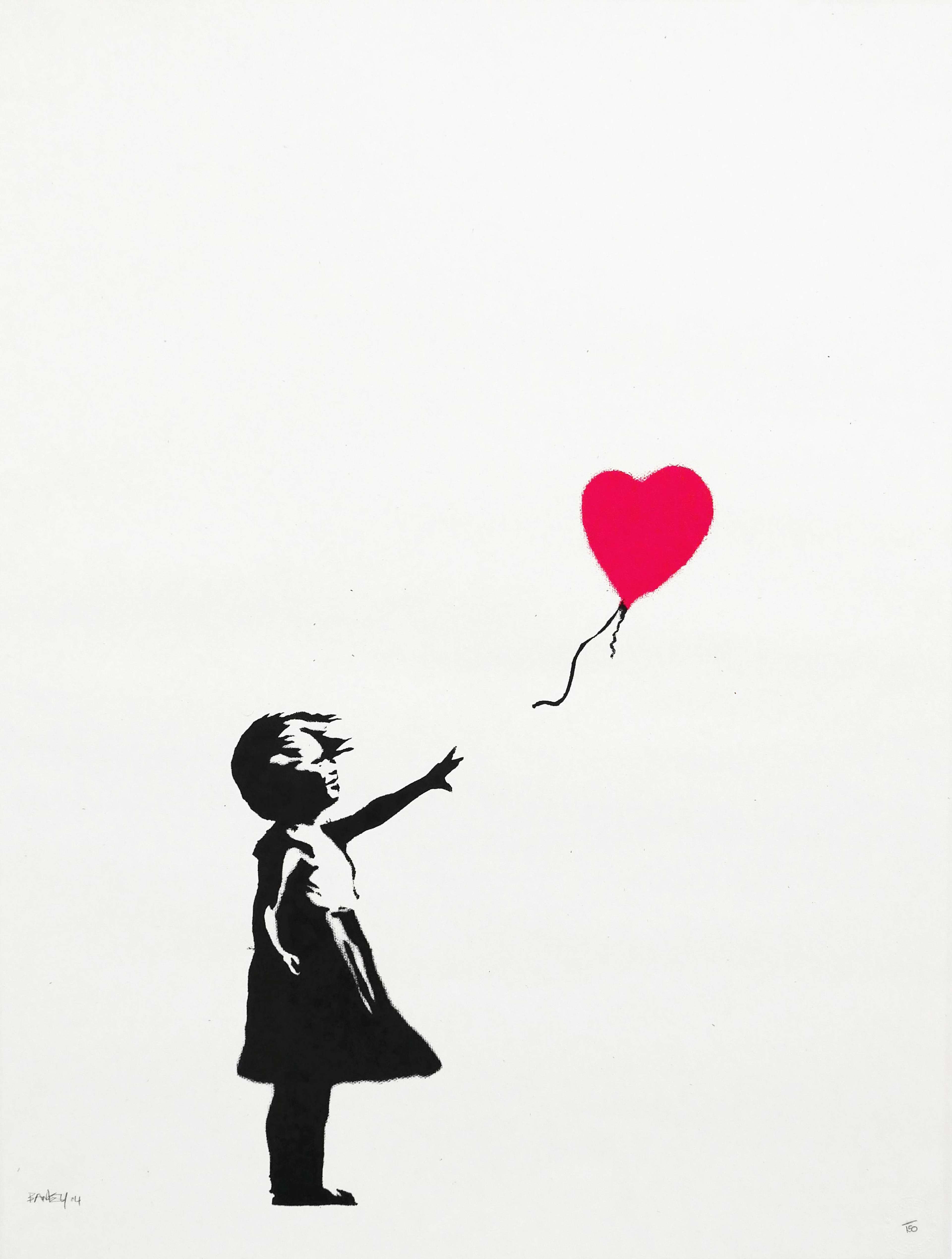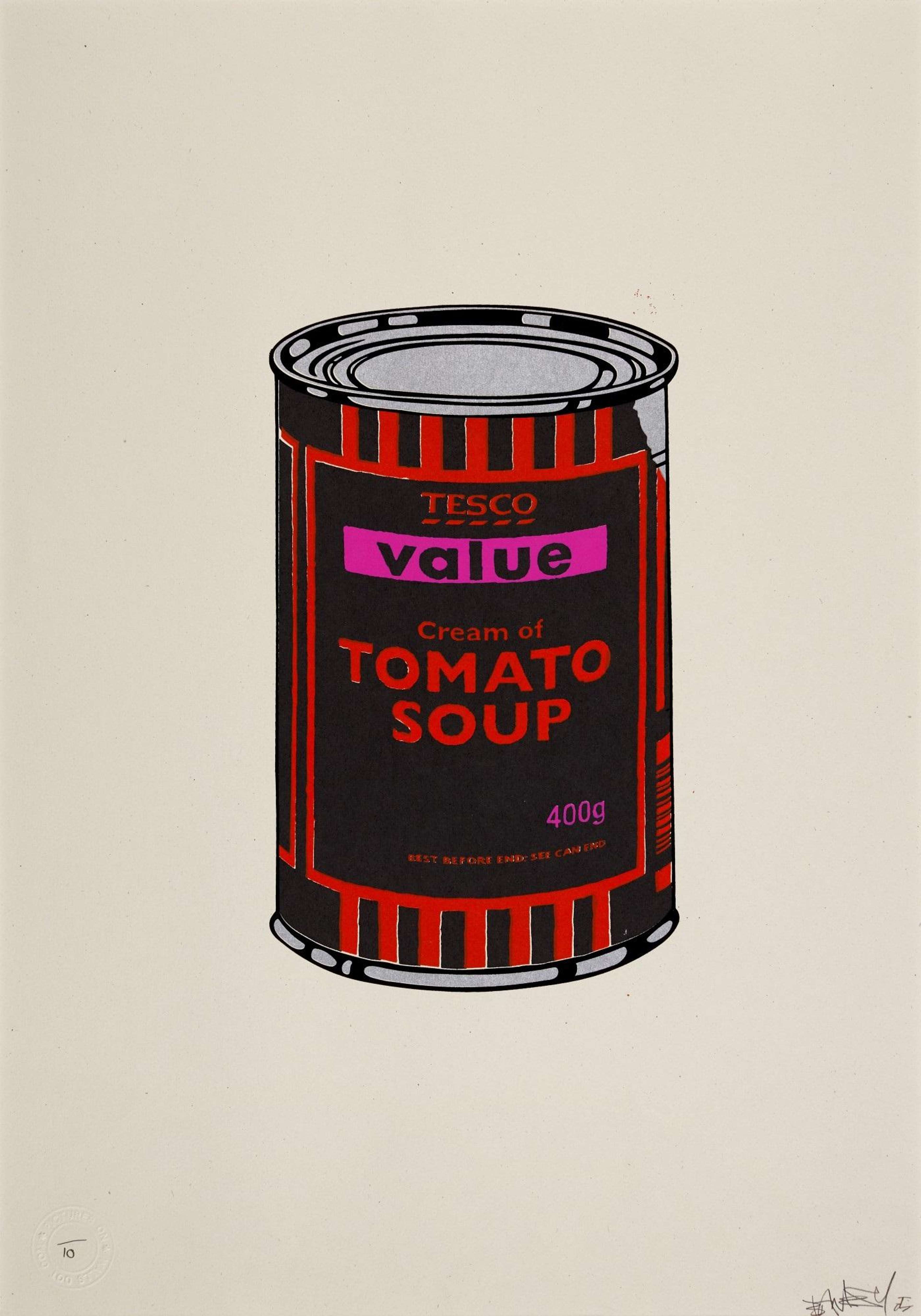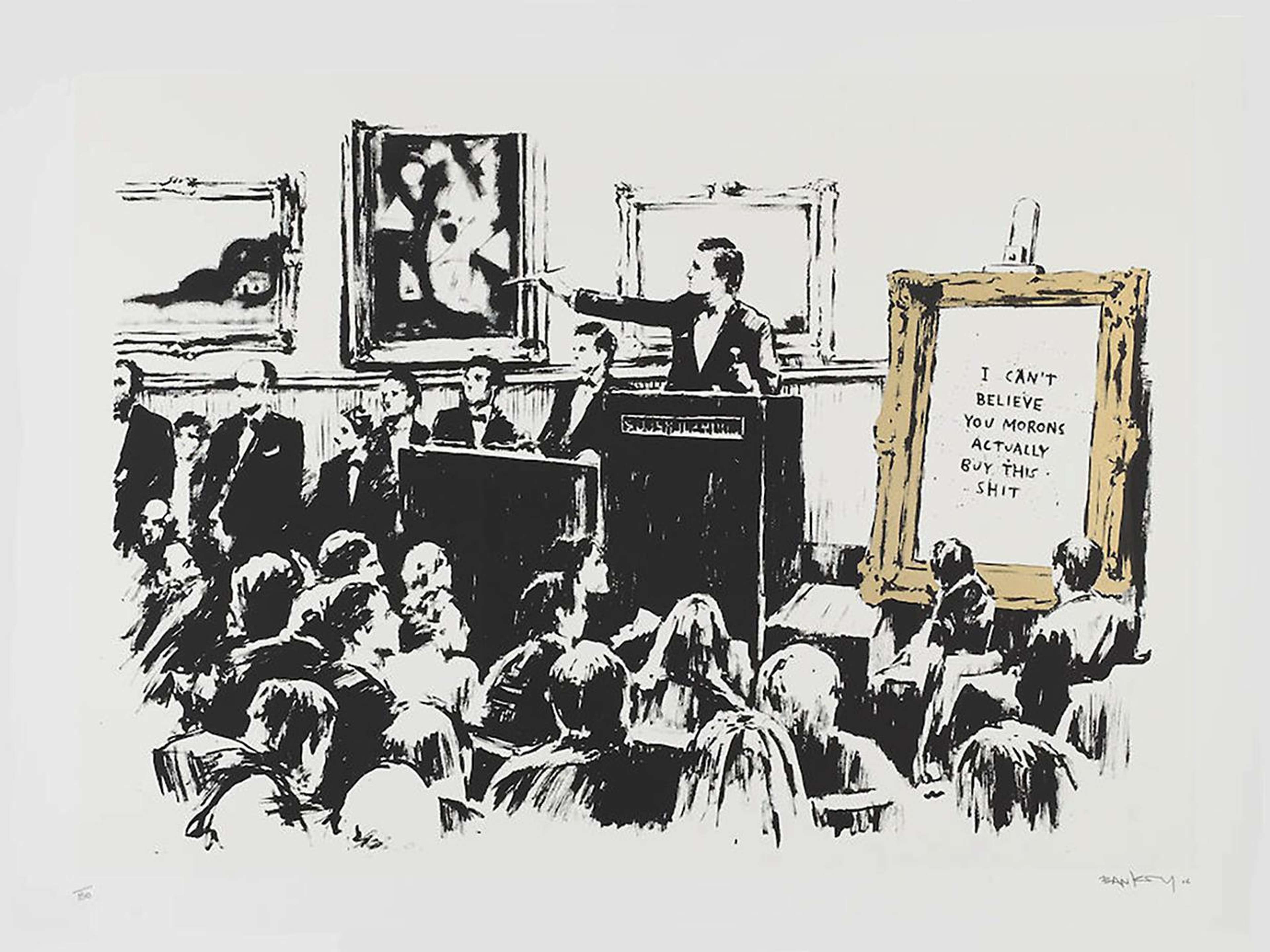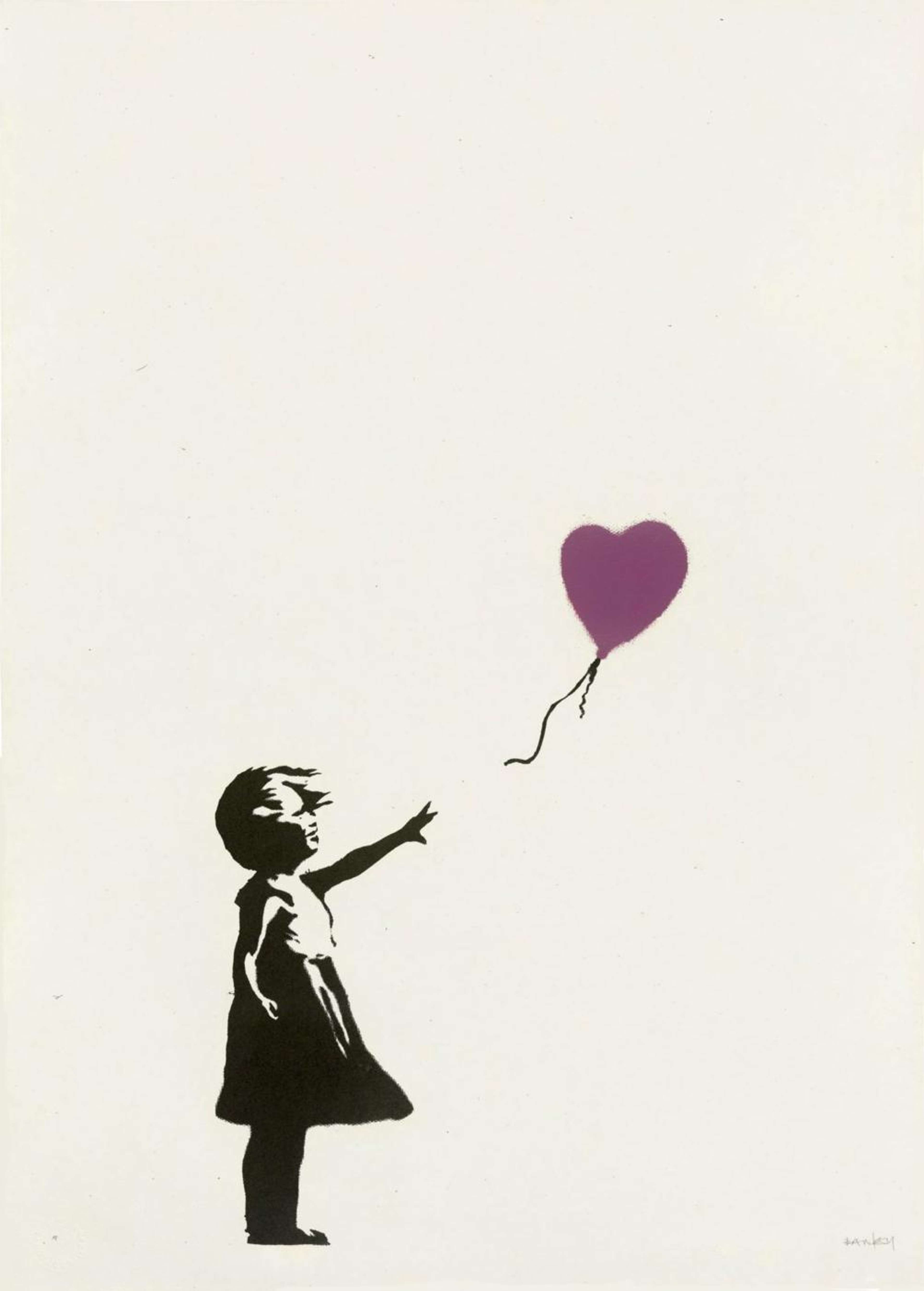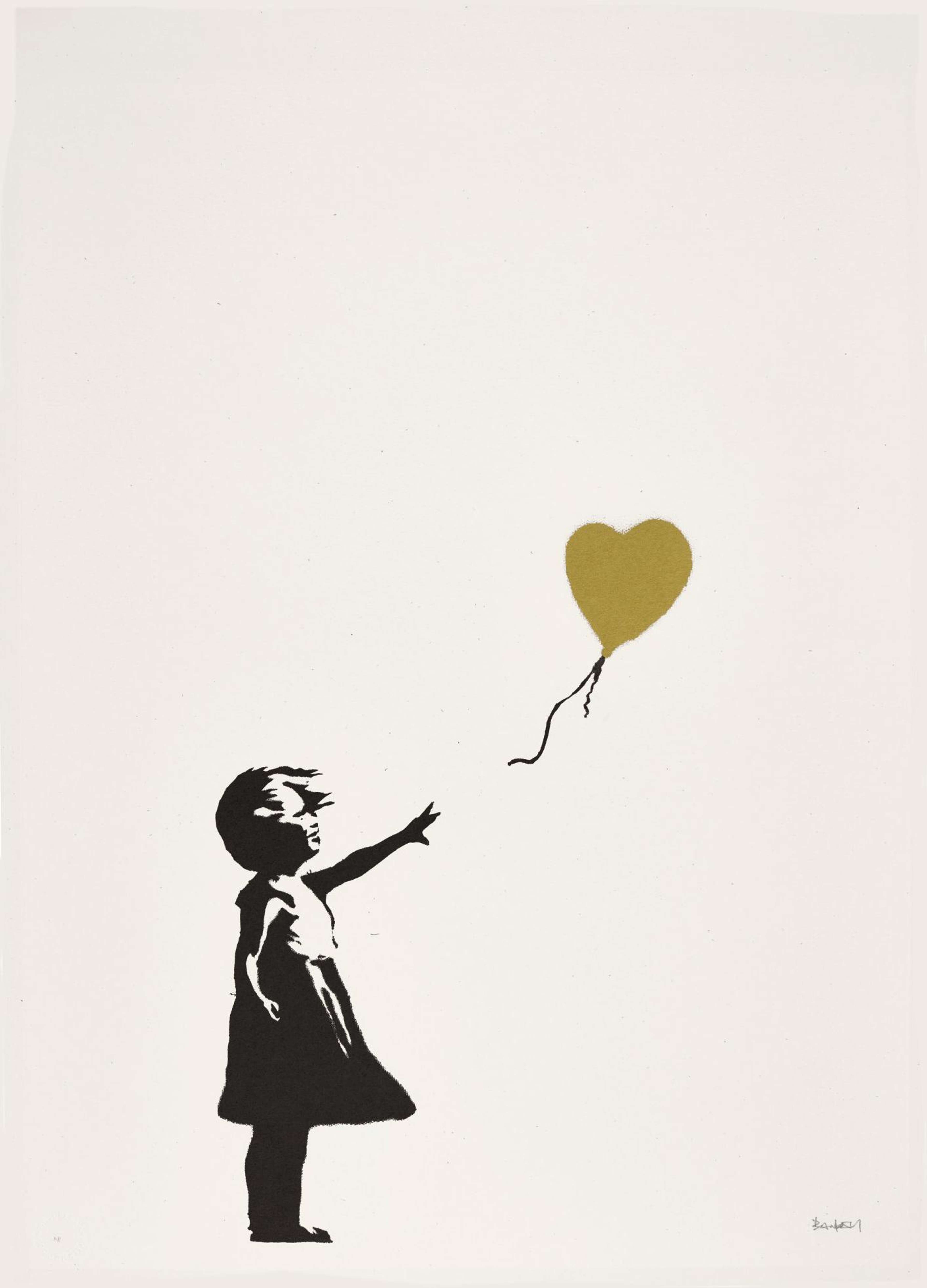 Image © Sotheby's / Love Is In The Bin © Banksy 2018
Image © Sotheby's / Love Is In The Bin © Banksy 2018
Banksy
270 works
On the 5th October 2018, bidders took their place at Sotheby's Contemporary Art Evening Auction. The final offering of the night was Banksy’s Girl With Balloon, a work which began its life in the streets: a far cry from the bourgeois auction house. Bidding commenced. Competing paddles were raised. Phone bids flooded in. Girl With Balloon rapidly soared above its presale estimate. The floor was totally intoxicated - as is always the case when a handsome lot meets a willing audience - with onlookers and bidders excitedly watching as the work climbed to £860,000.
The hammer fell. The floor erupted in applause. Much to the floor’s confusion, a loud beeping sound suddenly cut through the revelry and silenced the room. The auctioneer looked across the room in disbelief as heads began to turn towards Girl With Balloon, which was descending through its gilt frame in shreds. The artwork which, moments before, had sold for £1.04 million with fees - was ‘destroyed’.
Five years ago, Banksy executed one of the most meteoric stunts in art history. Employing a built-in shredder concealed within the frame, Girl With Balloon was shredded moments after its sale, an audacious assault on the art world and market long scorned by Banksy. Failing to destroy the entire work - which Banksy alleges was the original plan - a new artwork was created: Love Is In The Bin. This salacious and performative act has come to define the anonymous street artist, and continues to influence value and analysis of Banksy's work. Upon this five-year milestone, the questions it raised about art, value, and the nature of the art world and market remain as relevant as ever.
Sotheby’s Gets “Banksy’ed” on 5th October 2018
Shortly after Banksy’s greatest stunt, Sotheby’s confirmed that they had fallen victim to maverick street artist’s mischief; allegedly unaware of Banksy’s plan for the work. Alex Branczik, Senior Director and Head of Contemporary Art, Europe London at Sotheby’s - and auctioneer of the sale - reported back: “It appears we just got Banksy-ed”. The auction house described the destructive performance as “the first artwork in history to have been created live during an auction”, confirming its new title: Love Is In The Bin.
Banksy himself also confirmed that he was the instigator of chaos at Sotheby’s, posting a now-deleted video on his Instagram after the shred. This video was accompanied with the caption - “The urge to destroy is also a creative urge” - an apt and telling quote from Picasso. Banksy claimed that the artwork was supposed to shred the whole way through the frame, falling in worthless tatters on the floor. The artist complained, “in rehearsals it worked every time,” but stopped working halfway through the shred at Sotheby’s - a rather happy accident for the triumphant bidder of the work.
 The creation of Love Is In The Bin at Sotheby's, October 5th 2018
The creation of Love Is In The Bin at Sotheby's, October 5th 2018How Did Banksy Trigger the Shredder?
According to the video Banksy posted of his dastardly process, the concealed shredding mechanism within the frame was triggered by a remote-controlled button. In the video, we catch a glimpse of a pair of hands pressing down on the button just after Girl With Balloon was sold, activating the piercing beep of the shredder and sending the £1.04 million artwork down the path of destruction.
Though the shred happened at a fortuitous moment in the Banksy market, the artist allegedly installed the secret shredder inside the frame around 2006. The stunt is certainly reminiscent of Banksy’s early acts of subversion in the art world and market: from his chance appearances in the streets to his seditious exhibitions. Evidently, the shred was a long time in the making and - if one thing is certain about the mysterious Banksy - he is a master of good timing.
Did Sotheby’s Know About the Shredder?
To this date, Sotheby's adamantly reject accusations that they were party to Banksy's elaborate plan for Girl With Balloon. Even Banksy's ex-strategist, Steve Lazarides, debunked the conspiracies: “I worked for him for 12 years, the idea of him colluding with an institution to pull off a stunt is the complete antithesis to his philosophy.” Indeed, it seems almost impossible that Banksy - forever an enemy to the grandiose institutions of the art world and market - would collude with his enemies to facilitate the shred.
Why Did Banksy Shred Girl With Balloon?
Since his cataclysmic rise to fame, Banksy's oeuvre has always been underpinned by a deep aversion to authority both within and outside the art world. Famously using his public artworks to highlight the pitfalls of capitalism, Banksy's entire practice - from the subject matter of his works to the ways in which he makes and markets his art - totally overthrows tradition.
Protected by his anonymity, Banksy has never been afraid to be a voice to the voiceless in society, and use his work to point a finger at the hypocrisies and sheer excesses of the art world and its market. Dubbing his own clientele as “morons” who spend millions on his artworks, the shred was the ultimate manifestation of Banksy's scorn for art market institutions. The street artist waited for the opportune moment to infiltrate the auction house with his subversive spirit, using Sotheby's as his stage to challenge the commodification of art. Thanks to the accidental half-disfigurement of the work, the shred was not merely an act of destruction but the creation of something new: a dialogue about what art is and can be.
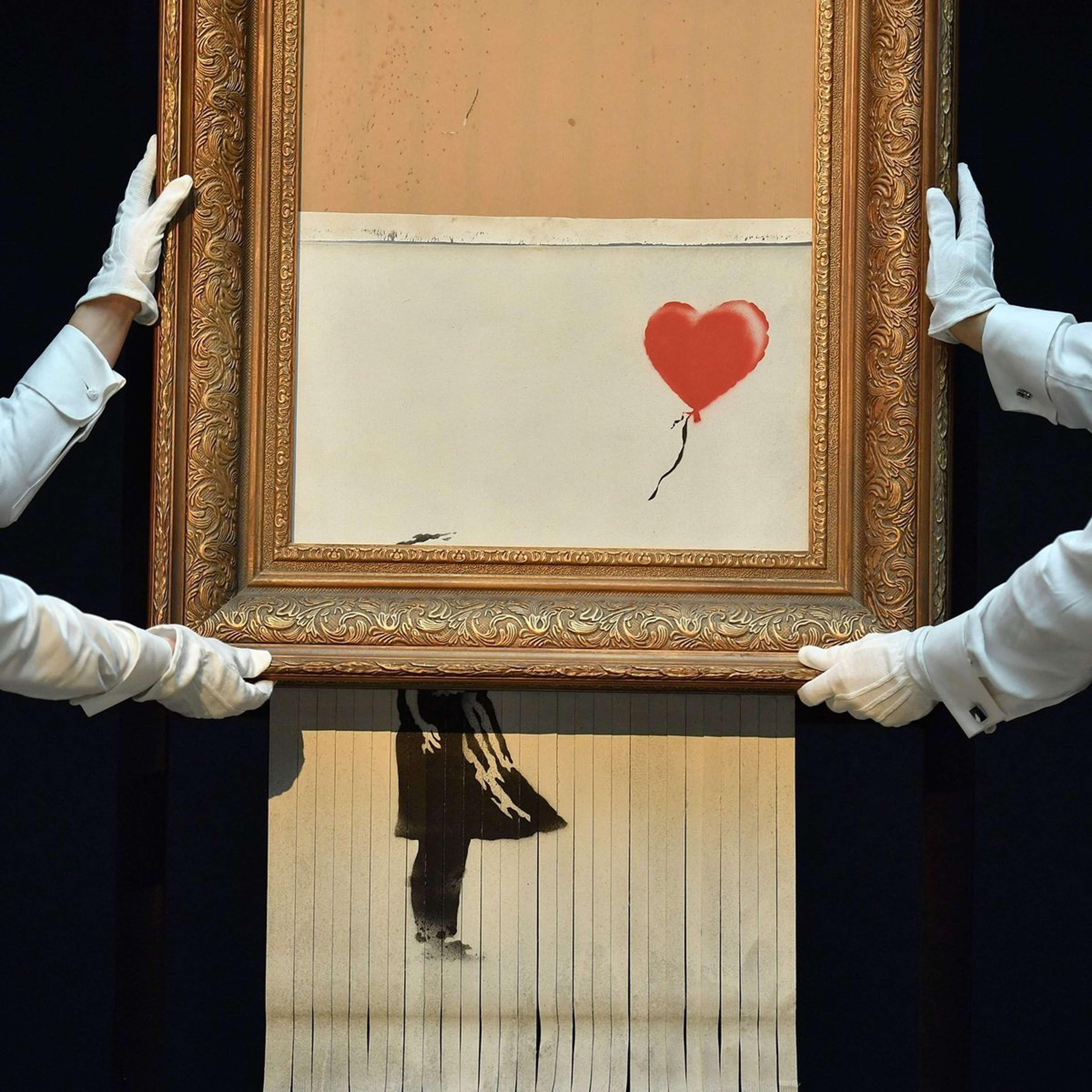 Image © Sotheby's / Love Is In The Bin © Banksy 2018
Image © Sotheby's / Love Is In The Bin © Banksy 2018The First Artwork Created Live at an Auction in History
The notorious shred was not just another shocking event in the Master of Stunt's magnum opus; it was a historic milestone in the annals of art. For the first time ever, an artwork was created live during an auction - transforming from one piece to another before the eyes of bidders who were totally unaware of the impending destruction. The shred blurred the lines between creation and destruction, between the artist's intent and the audience's experience, effectively redefining what constitutes “art” in the modern day.
Love Is In The Bin: An Accidental and Ironic Artwork
Rechristened as Love Is In The Bin, this was an accidental artwork which only served to bolster Banksy's message. When the work returned to auction in 2021, in its shredded state, it fetched an incredible £18.6million (again at Sotheby's). Indeed, Banksy's original aim to destroy his artwork and point a finger at the futility of the art market's money-driven approach was completely overthrown as the work soared in value to become the most expensive Banksy artwork ever sold at auction.
Love Is In The Bin is therefore a work that exists in two states: its original form as conceived by Banksy, and its transformed state post half-shredding. The duality of this work only adds layers of complexity to its interpretation and, indeed, its value. The work is both finished and in flux; its value diminished by its partial destruction and made intensely more valuable thanks to its newfound historical significance.
Protesting Against the Bourgeois Art World and Market
Undeniably Banksy's most calculated act of rebellion against the bourgeois art works and market, Banksy staged his shred at Sotheby's: the epitome of commodification in art - at least in Banksy's eyes. This was an act of protest as well as a performance art spectacle, as Banksy reclaimed agency over his work once the highest bidder had staked their claim.
By taking such ownership over the messaging of his artwork, Banksy made stark the reality that - since the art market grew into its current form - prices often overshadow the artist's intent and social commentary. The shred posited to the question to auction-goers and the world at large: is the art market, often driven by hype and speculation, the ultimate arbiter of what art is “worth”? Now legendary in the discourse of art history, the shred initiated global discussion about the purpose and value of art.
Girl With Balloon / Love Is In The Bin: Value Since 2018
The ultimate irony shrouding Banksy's shred is the sheer increase in value of the work after the artist attempted to destroy it completely. Banksy's attempt was ultimately futile, as the shredded work increased in value by some £17million between 2018-2021. This increase in value was not merely a result of market dynamics as the Banksy market hit its heyday, but a reflection of the artwork's unique history and the global media frenzy it sparked.
Girl With Balloon Soars in Value After the Shred
The market responded almost immediately to the shred. Banksy fanatics and art investors alike recognised that Love Is In The Bin was a Banksy artwork like no other; a pivotal moment in the trajectory of contemporary art. The value of the work was no longer driven solely by the artist's reputation in the art world and market, but by the newfound significance of the work once it had been transformed.
Once shredded, Love Is In The Bin became - at once - a symbol, a statement, an art historical milestone. Five years later, the work and performance continues to urge us to question how we establish value in art, and why.
Girl With Balloon Print Value Since the Shred
Alongside the sheer value growth of Love Is In The Bin, Banksy's other Girl With Balloon works also experienced the halo effect of the shred. This trend extended to his Girl With Balloon prints, as our value trend data demonstrates for the signed iteration of the print. Fuelled by the global fascination with Banksy's tongue-in-cheek performance, collectors and investors quickly reevaluated the value of this portfolio in particular.
Prior to the shred, these prints were already popular thanks to the icon-status of this subject in Banksy's oeuvre. The shred, however, significantly elevated their status: imbuing them with an unprecedented art historical significance and making them more desirably to collectors than ever before.
The Enduring Legacy of Banksy’s Shred: Five Years On
Five years after Banksy's most staunch assault on the art world yet, the shred continues to reverberate through public discourse. Today, the shred and Banksy's more recent subversive stunts force us to reconsider what constitutes an artwork and who gets to determine its fate.


